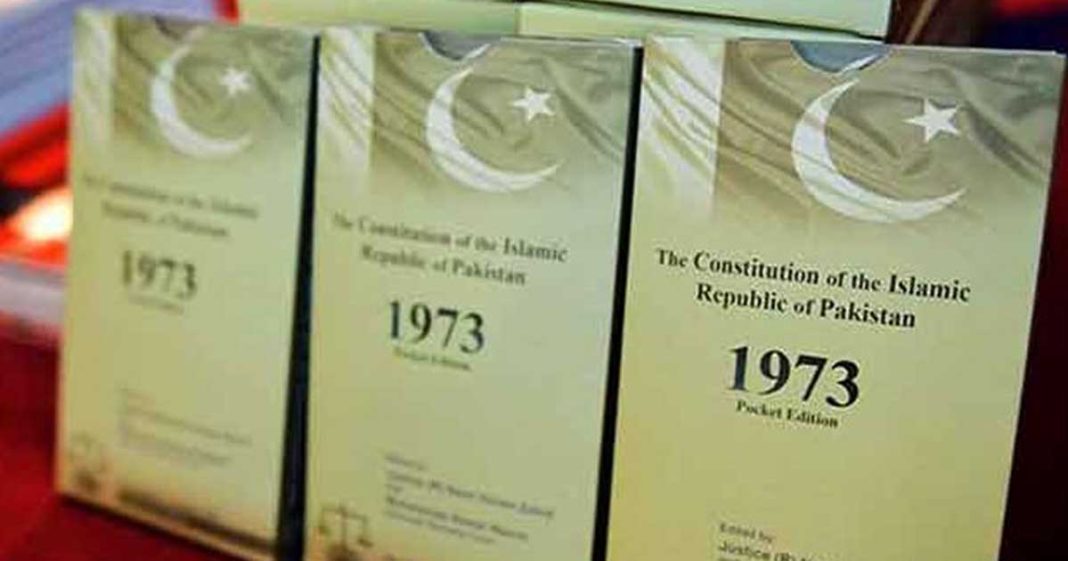Currently, as we stand at the time of going to print: the opposition is appealing in the Supreme Court against the National Assembly’s Deputy Speaker Qasim Suri’s decision to block the no-confidence motion (NCM) against Prime Minister Imran Khan in Parliament based on the NCM violates Article 5 of Pakistan’s Constitution.
“No foreign power shall be allowed to topple an elected government through a conspiracy,” he said. He dismissed the motion, ruling that it was “contradictory” to Article 5. It is this decision that the Supreme Court has to decide holds or not, which determines whether subsequent actions by the government are valid.
Article 5: Loyalty to State and obedience to Constitution and law.
5.1) Loyalty to the State is the basic duty of every citizen. [This clause was used by Qasim Suri – on the basis that a threat was posed by foreign interference to the Govt. of Pakistan through a regime change]
5.2) Obedience to the Constitution and law is the inviolable obligation of every citizen wherever he may be and of every other person for the time being within Pakistan.
After the rejection of the NCM by the Deputy Speaker, Prime Minister Imran Khan announced in a national address on TV that he has advised President Arif Alvi to dissolve the National Assembly, who did so under Article 58.1 of the Constitution.
Read more: Constitutional crisis of no confidence motion: In conflict with democratic norms?
Article 58: Dissolution of the National Assembly
58.1) The President shall dissolve the National Assembly if so advised by the Prime Minister; and the National Assembly shall, unless sooner dissolved, stand dissolved at the expiration of forty-eight hours after the Prime Minister has so advised.
Explanation – Reference in this Article to “Prime Minister” shall not be construed to include reference to a Prime Minister against whom a notice of a resolution for a vote of no-confidence has been given in the National Assembly but has not been voted upon or against whom such a resolution has been passed or who is continuing in office after his resignation or after the dissolution of the National Assembly.
Currently, PM Khan continues in office under Article 224 of the Constitution related to elections and by-elections until an interim government is setup.
Article 224: Time of election and by-election
224.A.4) The incumbent Prime Minister and the incumbent Chief Minister shall continue to hold office till appointment of the care-taker Prime Minister and the care-taker Chief Minister, as the case may be.
PML-N President Shahbaz Sharif and PPP Chairman Bilawal Bhutto contest that the PTI government has committed treason under Article 6 of the Constitution.
Read more: Understanding the legislation and constitution in Pakistan
Article 6: High Treason
6.1) Any person who abrogates or subverts or suspends or holds in abeyance, or attempts or conspires to abrogate or subvert or suspend or hold in abeyance, the Constitution by use of force or show of force or by any other unconstitutional means shall be guilty of high treason.
6.2) Any person aiding or abetting or collaborating the acts mentioned in clause (1) shall likewise be guilty of high treason.
The actions of the Deputy Speaker have been declared ultra vires to the constitution by the opposition, who have taken the case to the Supreme Court to decide (as we stand of time of printing Supreme Court has not given a decision)
In an exceptional event, the Supreme Court met on Sunday, 3 April, the day the events took place in parliament. Later, in a written order, the Court directed notice to the Attorney General for Pakistan Khalid Jawed Khan “on the constitutionality of the [deputy speaker’s] decision” to dismiss the no-trust motion on Article 5 of the Constitution. It further stated, “We would also like to examine whether such an action (dismissal of the no-trust motion on the basis of Article 5) is protected by the ouster (removal from the court’s jurisdiction) contained in Article 69 of the Constitution.”
PTI says Articles 66, 67, and 69 bar the Court from taking action against the parliamentarians’ decision.
Article 66: Privileges of Members
66.1) Subject to the Constitution and to the rules of procedure of 2[Majlis-e-Shoora (Parliament)], there shall be freedom of speech in 2[Majlis-e-Shoora (Parliament)] and no member shall be liable to any proceedings in any court in respect of anything said or any vote given by him in 2[Majlis-e-Shoora (Parliament)], and no person shall be so liable in respect of the publication by or under the authority of 2[Majlis-e-Shoora (Parliament)] of any report, paper, votes or proceedings.
66.2) In other respects, the powers, immunities and privileges of 2[Majlis-e-Shoora (Parliament)], and the immunities and privileges of the members of 2[Majlis-e-Shoora (Parliament)], shall be such as may from time to time be defined by law and, until so defined, shall be such as were, immediately before the commencing day, enjoyed by the National Assembly of Pakistan and the committees thereof and its members.
Read more: magPakistan’s top court to hear arguments on constitutional crisis
Article 67: Rules of Procedure
67.1) Subject to the Constitution, a House may make rules for regulating its procedure and the conduct of its business, and shall have power to act notwithstanding any vacancy in the membership thereof, and any proceedings in the House shall not be invalid on the ground that some persons who were not entitled to do so sat, voted or otherwise took part in the proceedings.
Article 69: Courts not to inquire into proceedings of Majlis-e-Shoora (Parliament)
69.1) The validity of any proceedings in 1[Majlis-e-Shoora (Parliament)] shall not be called in question on the ground of any irregularity of procedure.
69.2) No officer or member of 1[Majlis-e-Shoora Parliament)] in whom powers are vested by or under the Constitution for regulating procedure or the conduct of business, or for maintaining order in 1[Majlis- e-Shoora (Parliament)], shall be subject to the jurisdiction of any court in respect of the exercise by him of those powers.













